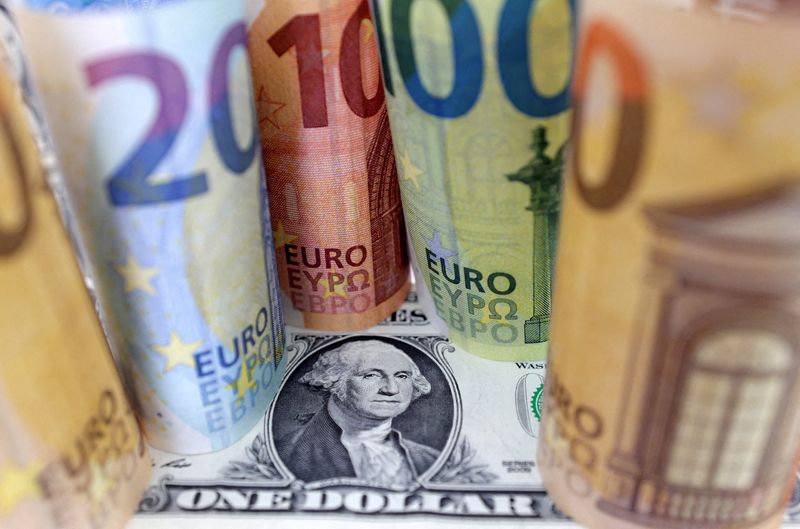By Saqib Iqbal Ahmed and Caroline Valetkevitch
NEW YORK (Reuters) -The dollar hit a one-week low against a basket of major currencies on Thursday as U.S. equities rebounded from the prior day's sell-off and investors braced for Friday's U.S. inflation data for clues to the path of future Federal Reserve policy.
Data earlier Thursday showed gross domestic product increased at a 4.9% annualized rate last quarter, revised down from the previously reported 5.2%. The consumer spending element of third-quarter GDP was revised downward to 3.1% from 3.6% in the previous estimate.
"The GDP number wasn't very helpful," said Marc Chandler, chief market strategist at Bannockburn Global Forex in New York. "We had a little bit less growth than we thought."
"But there is nothing (in the day's action) that says the market is having second thoughts about how aggressive it's anticipating rate cuts in the year ahead," he said. "The dollar has been generally soft ... so I think we're just churning for the most part."
The U.S. currency rose on Wednesday in a safe-haven bid after U.S. stocks' abrupt afternoon sell-off.
The Fed held interest rates steady last week and policymakers signaled in new economic projections that the historic monetary policy tightening engineered over the last two years is at an end and lower borrowing costs are coming in 2024.
A separate report on Thursday showed the number of Americans filing new claims for unemployment benefits rose just marginally last week, suggesting underlying strength in the economy as the year winds down.
Investor now await Friday's reading on U.S. core personal consumption expenditure (PCE) index. A November rise of 0.1% would slow the six-month annualized pace of inflation to just 2.1%, almost at the Fed's 2% target.
Some investors expect slower inflation will prompt the Fed to ease policy to stop real rates from rising, and are wagering on early and aggressive action.
The dollar fell 0.93% against the Japanese yen. Japan's government on Thursday slightly raised its economic growth projections for this fiscal year from its previous estimates.
The yen is down roughly 8% against the dollar for the year as the Bank of Japan has steadfastly kept short-term rates negative, against 300 basis points of U.S. interest rate hikes.
Sterling was up 0.4% at $1.2689 against the dollar on Thursday, a day after suffering its sharpest drop in two months on news that British inflation dived below forecasts to an annual 3.9% in October, a two-year low. Traders priced in Bank of England rate cuts as soon as May.
The dollar index, which tracks the U.S. currency against six peers, was last down 0.596% at 101.8. It hit its lowest level in a week.
Some analysts said month-end rebalancing in thin trade could weigh on the dollar in the near term.
"U.S. equity market outperformance through December rather suggests that passive hedge rebalancing flows will run against the USD through month end," said Shaun Osborne, chief FX strategist at Scotiabank.

The risk-sensitive Australian and New Zealand dollars traded higher on the day. The Aussie was last up 1.04% at $0.68005, after touching $0.68035. The kiwi traded up 0.74% at $0.6294.
Bitcoin was 0.29% higher at $43,791.